September 4
We can learn from our own experience and not make the same mistake twice. Or we can learn from history and not make the same mistake once.
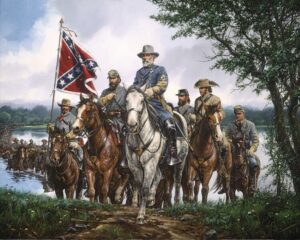
1862 – Confederate General Robert E Lee began his first invasion of the North, initiating the Maryland Campaign.
Lee wanted to maintain the momentum achieved with his stunning victory at Bull Run, which had left the retreating Union army in chaos. By advancing into Maryland, Lee believed he could relieve Virginia of enemy occupation, and he knew the Union army would have to mirror his movements and take up defensive positions in front of Washington and Baltimore.
The campaign would culminate in the Battle of Antietam (or Sharpsburg as it was called in the South) two weeks later.

1886 – Apache chief Geronimo surrendered to U.S. government troops. For 30 years, the mighty Native American warrior had battled to protect his tribe’s homeland, but by 1886 the Apaches were exhausted and hopelessly outnumbered. General Nelson Miles accepted Geronimo’s surrender, making him the last Indian warrior to formally give in to U.S. forces and signaling the end of the Indian Wars in the Southwest.
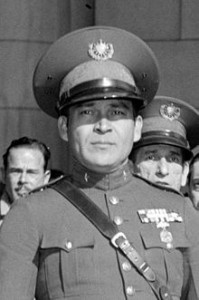
1933 – In an uprising known as the “Revolt of the Sergeants,” General Fulgencio Batista took over the Cuban government . The coup overthrew the liberal government of Gerardo Machado, and marked the beginning of the army’s influence as an organized force in the running of the government. It also signaled Batista’s emergence as self-appointed chief of the armed forces and favored U.S. strong man.
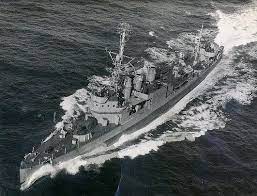
1941 – American destroyer Greer became the first U.S. vessel fired on in the war when a German sub aimed a few torpedoes at it, sparking heightened tensions between Germany and the United States.
Although the U.S. was still officially a neutral country, President Franklin Roosevelt unofficially declared war on anyone who further attacked American vessels in the North Atlantic: “If German or Italian vessels of war enter these waters, they do so at their own peril.”
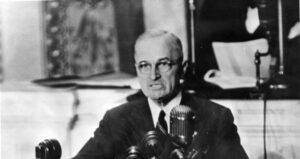
1951 – In the first live coast-to-coast TV broadcast, President Harry S. Truman addressed the nation from the Japanese peace treaty conference in San Francisco.

1957 – It was “E-Day” and the Ford Motor Company unveiled the Edsel, the first new automobile brand produced by one of the Big Three car companies since 1938. It was a colossal flop. In its first year, only 64,000 Edsels were sold and Ford lost $250 million ($2.7 billion today). After the 1960 model year, the Edsel brand folded.
The failure of the Edsel serves as a symbol of corporate hubris at its worst. It was an over-hyped, over-sized, over-designed monstrosity.
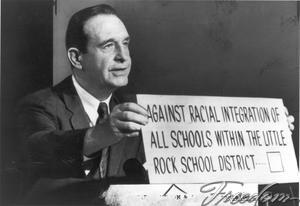
1957 – Under orders from Orval Faubus, the governor of Arkansas, armed National Guardsmen prevented nine African-American students from attending the all-white Central High School in Little Rock. What began as a domestic crisis soon exploded into a Cold War embarrassment.
The action taken by Faubus won him acclaim in his home state, and in much of the South, but it was a serious embarrassment to the administration of President Dwight D. Eisenhower. Eisenhower himself was no great supporter of civil rights, but he understood the international significance of the events in Little Rock. Pictures of the angry mob, the terrified African-American students, and National Guardsmen with guns and gas masks were seen around the world.
The Soviets could not have created better propaganda. Secretary of State John Foster Dulles informed Eisenhower that the Little Rock incident was hurting the United States overseas, and might even cost the country the support of other nations in the United Nations. Eisenhower tried to negotiate a settlement with Faubus, but when this failed, he sent in federal troops. The nine African-American students were finally allowed to attend Central High.

1993 – Jim Abbott of the New York Yankees pitched a no-hitter. Yes, no-hitters have been thrown many times in the history of baseball, but Abbott had a definite disadvantage. He was born without a right hand.
Abbott balanced the glove on his right arm, and as part of the follow through when he threw a pitch, he would slide the glove onto his left hand so he could catch any ball that came back to him.

2006 – Steve Irwin, Australian wildlife expert and television personality (The Crocodile Hunter) died when he approached a stingray allegedly 8 ft wide in chest-deep water from behind in order to film it swimming away. According to the only witness to the attack, the fish reacted to Irwin as if a shark was attacking, striking him several hundred times in the body with its tail spine. Irwin was 44.

2008 – Sen. John McCain accepted the Republican presidential nomination at the party’s convention in St. Paul, Minnesota.
His short list of running mates had included Mitt Romney, Mike Huckabee, and Joe Lieberman, the man McCain favored. However, the opposition from social conservatives, who objected to Lieberman’s pro-choice views, was too strong, and a Lieberman pick might have caused a floor fight at the convention.
McCain wanted someone who would shake up the race and reinforce his image as a maverick, so he decided against more conventional choices on his list and in a surprise move (understatement), selected Alaska governor Sarah Palin.

2014 – Comedian Joan Rivers died a week after going into cardiac arrest at a New York City clinic. She was undergoing a routine diagnostic procedure to examine raspiness in her voice and reflux, and was under anesthesia.
Rivers, who was 81, lacked sufficient oxygen to her brain for a prolonged period of time, which caused brain damage, the medical examiner said. Her heart had stopped after she was sedated with propofol and undergoing procedures to examine her condition.

2016 – Mother Teresa, revered for her work with the poor in India, was proclaimed a saint by Pope Francis in a ceremony at the Vatican.
Francis said Saint Teresa had defended the unborn, sick and abandoned, and had shamed world leaders for the “crimes of poverty they themselves created.”
Tens of thousands of pilgrims attended the canonization in St Peter’s Square.
Compiled by Ray Lemire ©2023 RayLemire.com / Streamingoldies.com. All Rights Reserved.